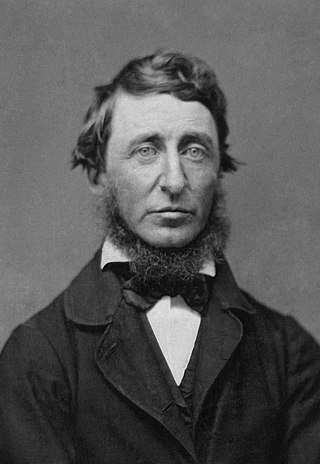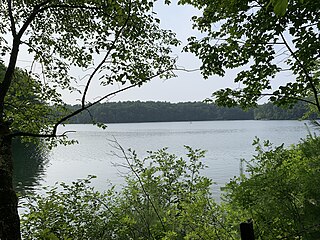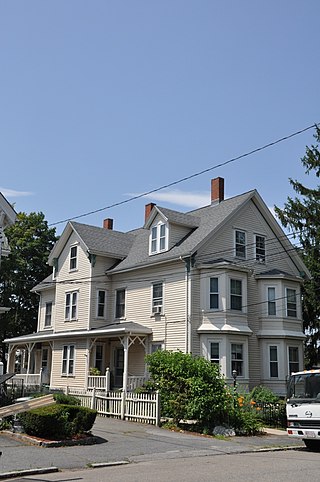
Henry David Thoreau was an American naturalist, essayist, poet, and philosopher. A leading transcendentalist, he is best known for his book Walden, a reflection upon simple living in natural surroundings, and his essay "Civil Disobedience", an argument in favor of citizen disobedience against an unjust state.

Concord is a town in Middlesex County, Massachusetts, United States. In the 2020 census, the town population was 18,491. The United States Census Bureau considers Concord part of Greater Boston. The town center is near where the Sudbury and Assabet rivers join to form the Concord River.

Walden is a book by American transcendentalist writer Henry David Thoreau. The text is a reflection upon the author's simple living in natural surroundings. The work is part personal declaration of independence, social experiment, voyage of spiritual discovery, satire, and—to some degree—a manual for self-reliance.

Walden Pond is a celebrated pond in Concord, Massachusetts, in the United States. A good example of a kettle hole, it was formed by retreating glaciers 10,000–12,000 years ago. The pond is protected as part of Walden Pond State Reservation, a 335-acre (136 ha) state park and recreation site managed by the Massachusetts Department of Conservation and Recreation. The reservation was designated a National Historic Landmark in 1962 for its association with the writer Henry David Thoreau (1817–1862), whose two years living in a cabin on its shore provided the foundation for his famous 1854 work, Walden; or, Life in the Woods. The National Historic Preservation Act of 1966 ensured federal support for the preservation of the pond.

The Old Manse is a historic manse in Concord, Massachusetts, United States, notable for its literary associations. It is open to the public as a nonprofit museum owned and operated by the Trustees of Reservations. The house is located on Monument Street, with the Concord River just behind it. The property neighbors the North Bridge, a part of Minute Man National Historical Park.

The Wayside is a historic house in Concord, Massachusetts. The earliest part of the home may date to 1717. Later it successively became the home of the young Louisa May Alcott and her family, who named it Hillside, author Nathaniel Hawthorne and his family, and children's writer Margaret Sidney. It became the first site with literary associations acquired by the National Park Service and is now open to the public as part of Minute Man National Historical Park.

Saugus Iron Works National Historic Site is a National Historic Site about 10 miles northeast of Downtown Boston in Saugus, Massachusetts. It is the site of the first integrated ironworks in North America, founded by John Winthrop the Younger and in operation between 1646 and approximately 1670. It includes the reconstructed blast furnace, forge, rolling mill, shear, slitter and a quarter-ton trip hammer.

Founded in 1941, the Thoreau Society is the oldest and largest organization dedicated to an American author. It is based in Concord, Massachusetts, United States, at the house where Henry David Thoreau was born in 1817. With members from all 50 states and countries around the world, the Society disseminates knowledge about Thoreau by collecting books, manuscripts, and artifacts relating to Thoreau and his contemporaries, by encouraging the use of its extensive collections, and by publishing two periodicals, the Thoreau Society Bulletin and the Concord Saunterer.

The Eagleswood Military Academy was a private military academy in Perth Amboy, in Middlesex County, New Jersey, United States, which served antebellum educational needs.
Walter Harding (1917–1996) was a distinguished professor of English at the State University of New York at Geneseo and internationally recognized scholar of the life and work of Henry David Thoreau. Harding was born in Bridgewater, Massachusetts, and received his B.S. from Bridgewater State College in 1939, M.A. from the University of North Carolina in 1947 and a Ph. D. from Rutgers University in 1950.

Tantiusques ("Tant-E-oos-kwiss") is a 57-acre (230,000 m2) open space reservation and historic site registered with the National Register of Historic Places. The reservation is located in Sturbridge, Massachusetts, and is owned and managed by The Trustees of Reservations; it is notable for its historic, defunct graphite mines. This is a rural area with much of the adjacent and surrounding area undeveloped and forested. The reservation is entirely forested with oak-hickory forest and red maple in the wet areas and mountain laurel abundant throughout the understory. The name Tantiusques comes from a Nipmuc word meaning “the place between two low hills." The Nipmuc used the graphite to make ceremonial paints. The property also contains the ruins of a 19th-century period house that belonged to a mine worker of mixed African American and Native American ancestry.

The Ralph Waldo Emerson House is a house museum located at 18 Cambridge Turnpike, Concord, Massachusetts, and a National Historic Landmark for its associations with American philosopher Ralph Waldo Emerson. He and his family named the home Bush. The museum is open mid-April to mid-October; an admission fee is charged.

The Thoreau–Alcott House is a historic house at 255 Main Street in Concord, Massachusetts, United States that was home to the writers Henry David Thoreau and Louisa May Alcott at different times.

The Wheeler-Minot Farmhouse, also known as the Thoreau Farm or the Henry David Thoreau Birthplace, is a historic house at 341 Virginia Road in Concord, Massachusetts, United States. It is significant as the birthplace of writer Henry David Thoreau. The house was listed on the National Register of Historic Places in 2004. It currently serves as a historic house museum and is open to the public.

The Highland House is a historic hotel building, now serving as a museum, located at 6 Highland Light Road within the Cape Cod National Seashore in Truro, Massachusetts. It is located in the Cape Cod National Seashore near the Highland Light in the Truro Highlands Historic District. The present two story wood-frame building was constructed in 1907 by Isaac Small, whose family had been serving tourists in the area since 1835.

The Charles Baker Property is a historic house in Waltham, Massachusetts. Built about 1882, it is a well-preserved example of a period two-family residence built for workers of the American Watch Company. It was listed on the National Register of Historic Places in 1989.

Fairyland Pond is a pond within Hapgood Wright Town Forest, a conservation area in Concord, Massachusetts. It is a popular recreation area, notable for its old-growth forest and its association with many literary figures from Concord’s past.

Eveleth Farm is a historic farmstead on Burpee Road in Dublin, New Hampshire, United States. Built about 1823 and enlarged in 1980, it is a well-preserved example of an early hill farmstead, noted for its association with Henry David Thoreau, who visited the farm during a stay in Dublin in 1852. The house was listed on the National Register of Historic Places in 1983.
The Walden Woods Project (WWP) is a nonprofit organization located in Lincoln, Massachusetts, devoted to the legacy of Henry David Thoreau and the preservation of Walden Woods, the forest around Walden Pond that spans Lincoln and Concord, Massachusetts. It was founded in 1990 by musician Don Henley to prevent two development projects in Walden Woods. Its mission has since expanded from conservation to research and education on the works of Henry David Thoreau. In 1998, the Thoreau Institute at Walden Woods was founded as part of the Project; today its library houses a collection of Thoreau-related resources.
Roland Wells Robbins (1908–1987) was an American archaeologist, author, and historian who is known for discovering the site of Henry David Thoreau's house at Walden Pond. His other discoveries include the Saugus Iron Works and the John and Priscilla Alden Family Sites.


















